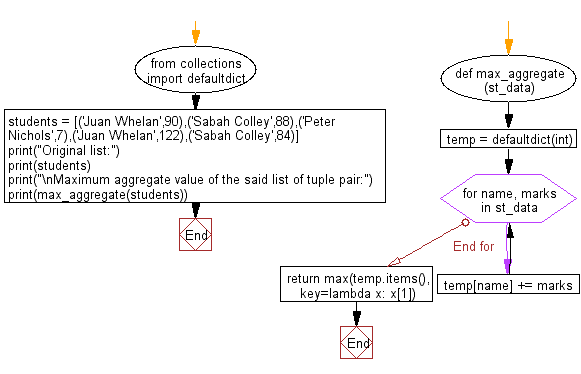Python: Calculate the maximum aggregate from the list of tuples (pairs)
Python Collections: Exercise-24 with Solution
Write a Python program to calculate the maximum aggregate from the list of tuples (pairs).
Sample Solution:
Python Code:
from collections import defaultdict
def max_aggregate(st_data):
temp = defaultdict(int)
for name, marks in st_data:
temp[name] += marks
return max(temp.items(), key=lambda x: x[1])
students = [('Juan Whelan',90),('Sabah Colley',88),('Peter Nichols',7),('Juan Whelan',122),('Sabah Colley',84)]
print("Original list:")
print(students)
print("\nMaximum aggregate value of the said list of tuple pair:")
print(max_aggregate(students))
Sample Output:
Original list:
[('Juan Whelan', 90), ('Sabah Colley', 88), ('Peter Nichols', 7), ('Juan Whelan', 122), ('Sabah Colley', 84)]
Maximum aggregate value of the said list of tuple pair:
('Juan Whelan', 212)
Flowchart:

Visualize Python code execution:
The following tool visualize what the computer is doing step-by-step as it executes the said program:
Python Code Editor:
Have another way to solve this solution? Contribute your code (and comments) through Disqus.
Previous: Write a Python program to get the frequency of the tuples in a given list.
Next: Write a Python program to find the characters in a list of strings which occur more than and less than a given number.
What is the difficulty level of this exercise?
Test your Python skills with w3resource's quiz
Python: Tips of the Day
Inverts a dictionary with unique hashable values:
Example:
def tips_invert_dictionary(obj):
return { value: key for key, value in obj.items() }
ages = {
"Owen": 29,
"Eddie": 15,
"Jhon": 22,
}
print(tips_invert_dictionary(ages))
Output:
{29: 'Owen', 15: 'Eddie', 22: 'Jhon'}
- New Content published on w3resource:
- Scala Programming Exercises, Practice, Solution
- Python Itertools exercises
- Python Numpy exercises
- Python GeoPy Package exercises
- Python Pandas exercises
- Python nltk exercises
- Python BeautifulSoup exercises
- Form Template
- Composer - PHP Package Manager
- PHPUnit - PHP Testing
- Laravel - PHP Framework
- Angular - JavaScript Framework
- React - JavaScript Library
- Vue - JavaScript Framework
- Jest - JavaScript Testing Framework
